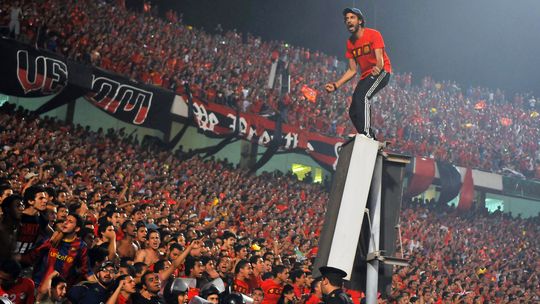
(AFP PHOTO / UN PHOTO )
Representatives from more than 30 nations and heads of international organisations kicked off the long awaited “Geneva II” talks in the lakeside town of Montreux, Switzerland.
The conference will be held in two sessions, the first on Wednesday and an expected second session on Friday at the United Nations Headquarters in Geneva.
The opening session was mediated by UN Secretary General Ban Ki-Moon, who invited the representatives from countries and organisations to address the conference. Minister of Foreign Affairs Nabil Fahmy used his allotted time to express his belief that a political solution to the Syrian conflict is possible, but warned that it would not be an easy process, with the potential to destabilise the entire region.
Fahmy called on the Syrian government’s representatives to show “clear intentions and to work in earnest on a solution” to end “the continuing tragedy” for the Syrian people as well as to “prevent the deterioration of the regional situation and the trend towards sectarian conflict”.
The minister stressed the need for the Syrian opposition forces “to unify the visions of its various components”. Fahmy offered Cairo as a venue to host a meeting of “the main forces of the Syrian opposition,” from both “inside and outside” Syria “to reconcile the vision among themselves” with the hope of “pushing for a political solution”.
Fahmy said Egypt “will work to provide the necessary support for the negotiation process in order to further its chances of success.”
The minister said that the goal of “restoring cohesion between the Syrians and among the peoples of this region” is “not far-fetched”. However, Fahmy also pointed out the need for any settlement should “preserve the sovereignty of Syria”, warning that an agreement that “carries with it the seeds of division [that] will have very serious repercussions on the Middle East as a whole and other neighbouring areas.”
The conference opened with remarks from the Swiss President and Ban, who said the representatives of the Syrian government and opposition “have an enormous opportunity and responsibility to render historic service to the Syrian people.”
The basis of the talks in Switzerland is for the implementation of the June 2012 Geneva Communiqué, the main aim of which is the establishment of a transitional government based on “mutual consent”.
United States Secretary of State John Kerry, said during his address: “We really need to deal with reality.” He elaborated upon the idea of a government formed on mutual consent, saying it “cannot be formed with someone that is objected to by one side or the other. That means [Syrian President] Bashar Al-Assad will not be part of that transition government.”
He added that the “brutal response to his own people” has stripped him of “the legitimacy to govern”. Kerry also said there is “no place for the thousands of violent extremists who spread their hateful ideology and worsen the suffering of the Syrian people.”
Syrian Foreign Minister Walid Muallem, who is heading the delegation of the Al-Assad regime, rejected the interference of the international community. He said: “If you really feel concerned about the humanitarian situation in Syria then let us be. Stop supporting the.. terrorists.” He called for a return to “the politics of reason.”
Speaking directly to Kerry, Muallem said: “No one in the world has the right to confer or withdraw the legitimacy of a president…except for the Syrians themselves.” He accused some countries of “putting people under siege” and of “supporting terrorism in Syria while speaking about the humanitarian situation.” He also claimed that there has been no international condemnation of the foreign fighters currently operating inside Syria, which he says is made up of nationals from 83 countries.
Muallem’s speech ran over the allotted 10 minutes allowed for each speaker, prompting Ban to intervene. The Syrian minister ignored the UN chief, saying: “I have the right to give the Syrian version here. After three years of suffering, I have the right.”
Muallem described the opposition fighters as “terrorists”, as has been the norm for the regime during the conflict. He insisted that the regime would “continue to fight terrorism that harms Syrians.” He added that any decisions made at the conference would be put to a referendum in Syria.
President of the Syrian National Council Ahmad Jarba stressed the opposition coalition would not negotiate until a timeframe for the implementation of the 2012 Communique and Al-Assad’s removal is established. He too accused Al-Assad of war crimes.
Jarba said the opposition’s decision to take up arms against the regime “was forced upon us to defend ourselves.” He said the Free Syrian Army, the opposition’s military branch, is fighting not only the regime forces but fighters from Iraq and Iran as well as Lebanese based Shi’a militant group Hezbollah.
The Syrian conflict began in 2011 following a brutal response from the Al-Assad regime to protests calling for his removal. Since then, it is estimated that over 130,000 people have died in the conflict. Ban said: “More than 6.5 million people are internally displaced. More than 9.3 million people in Syria need humanitarian aid, with more than 2.5 million of them living in areas where humanitarian access is seriously constrained.”
The international community has been somewhat divided over the conflict. Iran, Russia and China have been among supporters of Al-Assad, stressing the need for a political solution but not the departure of the president. Another group of nations, including those from the West and the Arab World, have stood opposed to the regime to the point where a military strike on regime targets was discussed in parliaments around the world. Egypt opposed a military strike, stressing the need for a political solution to the conflict, a notion that was endorsed by many of the speakers in Montreux on Wednesday.
